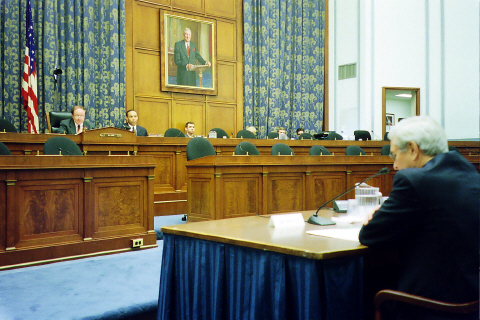
John Mercer testifying before the U.S. House of Representatives Subcommittee on
Government Efficiency, Financial Management, and Intergovernmental Relations.
Hearing on GPRA Implementation and Federal Management Reform June 19, 2001
In 1993, Congress enacted the Government Performance and Results Act . Commonly known as GPRA, this legislation is the foundation of the most fundamental reform of the federal government in decades. For the first time, federal agencies were mandated to become specifically results-oriented. Under GPRA, they are required to develop long-term Strategic Plans defining general goals and objectives for their programs, to develop Annual Performance Plans specifying measurable performance goals for all of the program activities in their budgets, and to publish an Annual Performance Report showing actual results compared to each annual performance goal. The Annual Performance Plan goals should show the expected progress toward meeting the long-term goals of the Strategic Plan, and both plans must describe the strategies and various resources needed to meet their goals.
GPRA, in other words, began to shift the focus of federal agencies from simply accountability for process (e.g., did the program spend the correct amount of money in a proper manner?) to accountability for results (e.g., what did the program actually accomplish with the money it spent?) In doing so, the legislation introduced an important new emphasis into federal performance measurement – the need to identify desired outcomes. The distinction between measuring program outputs (i.e., how much will be done?) and measuring actual outcomes (i.e., to what end result?) is fundamental to the ultimate accountability of Congress and federal agencies for the effectiveness of the programs they create, fund and administer.
The Government Performance and Results Act was directly inspired by the very sophisticated performance-based management and budgeting system of the city of Sunnyvale, California. The idea for GPRA was proposed to Senator William V. Roth, Jr. (R-DE) in January 1990 by John Mercer, a former Mayor of Sunnyvale . At that time Mr. Mercer was working for Senator Roth as Republican Counsel to the U.S. Senate Committee on Governmental Affairs. Senator Roth authorized Mr. Mercer to develop the legislation, which the Senator first introduced in its earliest version on October 3, 1990 as S. 3154, and in subsequent versions as S. 20 in 1991 and 1993. John Mercer is now a consultant to US and foreign governments on performance-based budgeting/management.
The Government Accountability Office (GAO) has described GPRA as being “the centerpiece of a statutory framework Congress put in place during the 1990s to address long-standing weaknesses in federal operations, improve federal management practices, and provide greater accountability for achieving results.” In fact, as explained by John Mercer in his congressional testimony , GPRA was originally drafted with the specific intent that it serve as a basis for bringing such additional reforms to the federal government as cost accounting, performance-based budgeting, and managerial pay-for-performance. For example, the earliest versions of the legislation (as S. 20) would have required that agency plans include goals for “costs per unit-of-result, unit-of-service, or other unit-of-output.” (This provision was removed prior to enactment of the law, because federal agencies at that time were not yet required to have the requisite cost accounting systems.)
This is why it is important to understand GPRA’s interrelationship with the other requirements that comprise the Big Picture of federal management reform. To be effective in implementing comprehensive performance management throughout an organization, an agency’s GPRA compliance efforts must be coordinated with, and in indeed guide compliance with, these other reforms. GPRA implementation can thereby serve as the means for instilling a program results focus into the implementation of mandated reforms in such areas as financial management, budgeting, human resources management, procurement, and information technology acquisition and management.